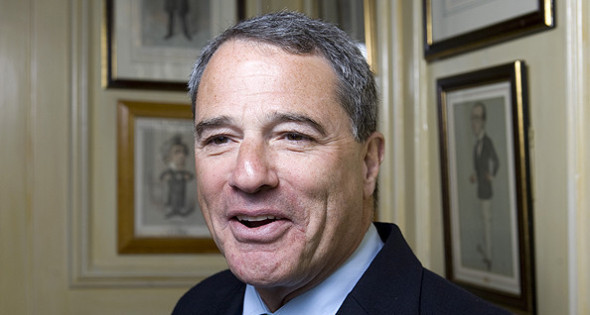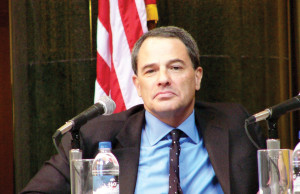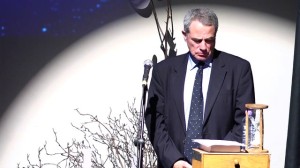Last year, turbulence in the Middle East and the repercussions of the Arab Spring were most acutely felt in Syria. The carnage in Syria dominated the headlines last year. With a wealth of experience in the Middle East, Charles Glass remained at the forefront of news reportage. Assad’s durability is no surprise to him, “I think anybody who knows Syria well did expect Assad to last this long. It is a regime that has been in power since 1970 and they have rendered themselves impervious to military coups because their security system is so effective and they are used to dealing with opponents in a very brutal way but in a way that has kept them at bay for many years.”
He describes the Arab Spring as a ‘bitter pill’ for those who initiated it as the outcome has been at variance with their aspirations. “The outcome has not been what they expected, especially in Egypt where they thought they would get a democracy but got a regime which they themselves wanted to overthrow and ended up with a military takeover, which is not what they started in February 2011, they wanted to get rid of the military. Mubarak is a military man, he had a military dictatorship with fraudulent elections and now they are back in a worse position than when they started.”
In his view, the military regime in Egypt will last for a while:“It looks like Egypt will remain a military dictatorship for some time or there will be a civil war as in Algeria when the military cancelled the elections there.”
He shares his views on militancy in the Middle East and the spawning of militant groups. “I think it’s unfortunate for the western world but much more unfortunate for the Muslim world because most Muslims don’t want to live under the kind of regime they encourage. The Salafist regime excludes non-Sunnis. An unfortunate development, but perhaps not entirely surprising, that there would be some form of reaction to western behaviour in their countries: the constant invasions, the sustaining of dictatorships, the supply of billions of dollars worth of arms to corrupt regimes — people are going to react. In the 1960s and 1970s, the reaction was from the left which again the western world was anxious to crush.”
As a graduate student in Beirut, Charles Glass was drawn to a career in journalism after meeting Peter Jennings and Bill Blakemore at ABC News. “I learnt the trade from them.” He counts Noam Chomsky as one of his best friends.
Charles Glass is a broadcaster, journalist and writer, who began his journalistic career in 1973 at the ABC News Beirut bureau with Peter Jennings. He covered the October Arab-Israeli War on the Egyptian and Syrian fronts. He also covered civil war in Lebanon, where artillery fire wounded him in 1976. He was ABC News Chief Middle East correspondent from 1983 to 1993. Since 1993, he has been a freelance writer in Paris, Tuscany, Venice and London, regularly covering the Middle East, the Balkans, Southeast Asia and the Mediterranean region. He has also published books, short stories, essays and articles in the United States and Europe.
In 1986, Glass interviewed the hostage crew of TWA flight 847 on the tarmac of Beirut Airport. He broke the news that the hijackers had removed the hostages from the plane and hidden them in the suburbs of Beirut, causing the Reagan Administration to abort a rescue attempt. In 1987, Glass himself was abducted and held hostage for two months before escaping from his Shiite Muslim captors. In 1988, he exposed Saddam Hussein’s then-secret biological weapons program. The U.S. government rejected Glass’s claims, until Iraq invaded Kuwait in 1990. In addition, Glass was the only U.S. television correspondent in northern Iraq covering the entire Kurdish rebellion in 1991. One year later, he went alone with a hidden camera to Indonesian-occupied East Timor and, despite government restrictions, filmed and filed a report on repression and torture. This report influenced a U.S. Senate committee to vote to suspend U.S. military aid to Indonesia. He has covered wars in the Middle East, Eritrea, Rhodesia, Somalia, Iraq and Bosnia-Herzegovina. He was the overseas and investigative correspondent for CNN & TIME, a weekly news magazine that ran on CNN from 1999 to 2001. He covered the 2003 invasion of Iraq for ABC News and Harper’s magazine. He returned to Iraq in 2004 for The Independent and the London Review of Books.
Glass has served as a correspondent for Newsweek magazine and The Observer. For more thirty years, he has been a regular contributor and columnist in newspapers and magazines in the United States and the United Kingdom. He has lectured regularly on the Middle East, American foreign policy, world journalism and human rights in the United States and Britain. His work has appeared in TIME magazine, The Christian Science Monitor, Chicago Daily News, The Guardian, The Daily and Sunday Telegraph, The Independent and Independent on Sunday, The Spectator, New Statesman, Times Literary Supplement, Rolling Stone, Esquire, GQ and The American Conservative. He has published short fiction in Granta and The London Magazine. He is a special correspondent for London Review of Books.
Charles Glass has authored several critically acclaimed books on the Arab world, including: Tribes with Flags, Money for Old Rope, The Tribes Triumphant, The Northern Front, Americans in Paris: Life and Death Under the Nazi Occupation, 1940-1944 and Deserter: The Last Untold Story of the Second World War.








